16 Young People Sued Montana Over the Climate. The Planet Won.
A state district court ruled yesterday that Montana’s failure to document greenhouse gas emissions violates children’s constitutional right to a clean and healthful environment.
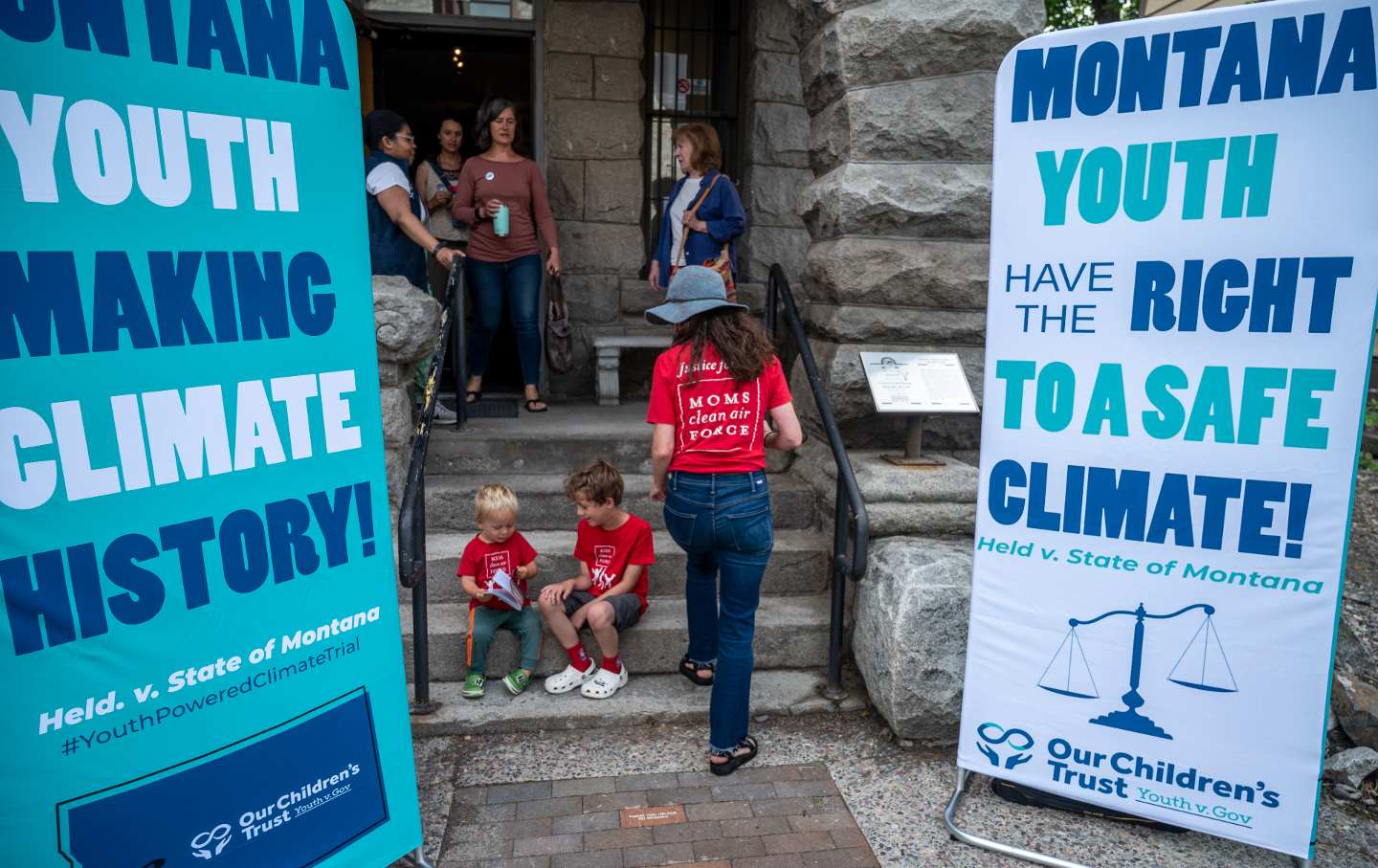
Supporters gather at a theater next to the courthouse to watch the court proceedings for the nation’s first youth climate change trial at Montana’s First Judicial District Court on June 12, 2023, in Helena, Mont.
(William Campbell / Getty Images)Helena, Mont.—Four years ago, Shane Doyle spoke at a climate action rally in Bozeman. Afterward, a Montana State University (MSU) student approached him to ask whether his three daughters would consider joining a climate lawsuit against the state. He struggled with the decision. “It’s hard as a parent,” said Doyle, an Indigenous educator with a doctorate from MSU. “What are you supposed to do? Try to allow them to live a normal childhood, or do you confront them with the brutal truth: Your childhood is not going to be normal”?
In the end, he let them decide. Together, they talked about how their lives had been affected by wildfire smoke, drought, and storms. As members of the Crow Tribe, some of their concerns tied back to traditional practices. “We were seeing the effects of climate change in our daily lives,” said Ruby Doyle, who is now 15 years old, “and on the traditions we have as a family, like chokecherry picking and Crow Fair.”
A seasonal gathering of tribal members on the Yellowstone River, Crow Fair has been plagued by intense heat, wildfire smoke, and flooding in recent years, extreme weather conditions that have also impacted wild chokecherries, according to Doyle.
“Chokecherries are a sacred food, and, as a researcher, I know that some of the oldest archaeological sites in our state have chokecherry remnants,” he explained. “But over the past few years, the drought has been so bad that there were hardly any chokecherries.”
Other concerns were practical. “When we first started the climate case, my asthma was pretty bad,” Ruby told me, referring to the summer of 2020, which according to measurements was Montana’s worst fire season in 2,000 years. “I had to stay inside fairly often because of the smoke outside. At school, recess was canceled. I just couldn’t enjoy daily life as much.”
Ultimately, his oldest daughter declined to join the lawsuit, but Ruby, and her younger sister, Lillian—then aged 12 and 9—signed on. The two of them and 14 others sued, claiming that Montana’s permissive approach to fossil-fuel mining, drilling, and combustion violated their constitutional rights. On June 12, their case became the first youth climate case to go to trial in US history. And on August 14, they won.
In her decision, Judge Kathy Seeley of Montana’s 1st Judicial District Court, based in Helena, ruled in favor of the youth plaintiffs in Held v. State of Montana. She declared that the state violated their constitutional rights to equal protection, dignity, liberty, health and safety, and public trust—all of which, she determined, are predicated on their right to a clean and healthful environment.
“Each additional ton of GHGs [greenhouse gases] emitted into the atmosphere exacerbates impacts to the climate,” she wrote. “Plaintiffs’ injuries will grow increasingly severe and irreversible without science-based actions to address climate change.” For these reasons, she declared unconstitutional the state laws prohibiting Montana agencies from considering climate change or greenhouse gas emissions when permitting fossil fuel activities.
The defendants are expected to appeal her decision to the Montana Supreme Court. But for the foreseeable future, the state will be required to disclose climate impacts in its permitting decisions and consider the legal liability associated with those emissions.
“This is a big deal,” Bill McKibben, founder of 350.org, told me. “A court—and in Montana of all places—has held that governments must actually pay attention to the damage we’re doing to the future. This idea—in some ways the most obvious ethical notion there is, but one we’ve been painfully slow to act on—is gathering momentum.”
On March 13, 2020, 16 young Montanans (ages 9 to 22) sued Governor Greg Gianforte, three state agencies (Environmental Quality, Natural Resources, and Transportation) and the Public Service Commission, a five-person panel elected to regulate energy utilities. They challenged provisions of Montana’s State Energy Policy, which promoted fossil-fuel development, and the Montana Environmental Policy Act (MEPA), which forbid the state from considering the impacts of greenhouse gas emissions or climate change in their environmental reviews of new mines, drilling permits, and other requests to extract and combust fossil fuels. This latter provision is known as the MEPA Limitation.
Since 2011, attorneys for Our Children’s Trust (OCT), the nonprofit law firm representing these plaintiffs, have filed similar suits across the country, but they were especially keen to pursue a case in Montana because of the state’s unique constitution. When voters approved the state Constitution in 1972, they established “the right to a clean and healthful environment” as the first among several inalienable rights for all Montana citizens.
Other states have environmental protections, but no other state meets this legal standard, according to David Schwartz, an OCT attorney working on the case. “Montana’s protection is the most robust, because it’s a fundamental right, so the burden is on the state to show that the law is narrowly designed to advance a compelling state interest,” he explained. “It has also been the subject of significant litigation, so the state Supreme Court has had a chance to deliberate its meaning.”
Popular
“swipe left below to view more authors”Swipe →For this reason, the state worked aggressively to derail the case under two different Republican attorneys general, Tim Fox and Austin Knudsen. A month after the suit was filed, Fox moved to dismiss the case. But two years later, Seeley denied that motion in a judgment that signaled the strength of the plaintiffs’ position and validated OCT’s legal strategy.
Seeley worked for 23 years as an assistant attorney general under Republican and Democratic governors before Lewis and Clark County voters first elected her as a district court judge in 2008. She’s since been reelected twice and is currently in her third six-year term. When she denied Fox’s motion, she cited a majority opinion by the Montana Supreme Court in a 1999 water quality case: “Our constitution does not require that dead fish float on the surface of our state’s rivers and streams before its farsighted environmental protections can be invoked.”
According to Seeley, this 24-year-old ruling affirmed Montanans’ right to a clean and healthful environment as “both anticipatory and preventative”—an ideal interpretation for those seeking to stem environmental degradation due to climate change—and she cleared the case for trial.
Undeterred, Knudsen, who succeeded Fox in January 2021, asked the state Supreme Court in June 2022 to take supervisory control of the case. When the court declined, Republican legislators got involved. Using their supermajority in the state House and Senate, GOP legislators repealed the state energy policy last March. Then, they suspended their own rules to allow the late introduction of HB 971, a bill explicitly prohibiting any government analysis of greenhouse gas emissions “and corresponding impacts to the climate.” It passed four days before the session ended.
The first of these last-minute measures did affect the case. In May, Seeley dismissed the plaintiffs’ claim regarding the now nonexistent energy policy, but she kept their claim regarding the MEPA Limitation. Plaintiffs’ injuries, she wrote, “are fairly traceable to state actions preformed pursuant to MEPA… and could be alleviated by an order declaring the MEPA Limitation unconstitutional.”
And that’s exactly what she did yesterday. In her ruling, she stated, in no uncertain terms, “Montana’s contributions to GHG emissions can be measured incrementally and cumulatively both in terms of immediate local effects and by mixing in the atmosphere and contributing to global climate change and an already destabilized climate system.”
If efforts to appeal the case are unsuccessful, then the state will have to begin recording those measurements and making them public. Judge Seeley wrote that these measurements “would provide the clear information needed to conform their decision-making to the best science and their constitutional duties and constraints, and give them the necessary information to deny permits for fossil fuel activities when inconsistent with protecting Plaintiffs’ constitutional rights.”
“The dam has finally broken,” said Anne Hedges, policy director for the Montana Environmental Information Center (MEIC), a nonprofit that has litigated pollution cases for over 50 years. “Suddenly, we can talk about climate change. The question now is what happens next.”
The question moving forward is whether this requirement will result in a decrease in emissions. After all, Montana is a red state with a Department of Environmental Quality that hasn’t denied a permit for a coal, oil, or gas operation in three decades. And Seeley’s decision doesn’t obligate the state to mitigate climate impacts.
“We’re not Oregon. We’re not Washington. This state is going to dig in its heels,” Hedges said. “It’s organizations like MEIC who will have to breathe life into this decision.”
Hedges alluded to existing and pending litigation designed by MEIC to achieve that goal, and the central question in future court decisions, she asserted, will be determined by this case: “Is the climate a part of the environment? Yes or no.” She believes Held v. Montana has now legally answered that question, and the case will be the first of many losses for the Republican-controlled state government on climate cases over the next few years.
More from Montana
How many more years of litigation will be required before meaningful change occurs is a matter of speculation, but, as this question plays out in Montana, ripple effects from Seeley’s decision will be felt across the country. “It’s going to make other judges braver,” Hedges predicted.
Schwartz agreed, saying that, above all, “this case demonstrates that climate impacts are justiciable.” In other words, government actions that exacerbate climate change and cause individual harm, which have been mostly confined in legislative chambers, are now suitable for debate in a court of law, where, he points out, “facts actually matter.”
Perhaps more importantly, the ruling held the state responsible for violating several constitutional rights, not just the right to a clean and healthful environment. This means Seeley’s ruling will be more compatible with the legal structures of other states that don’t have strong environmental rights enshrined in their Constitutions.
“One of the key reasons we wanted Seeley to rule on several constitutional rights is because other states have those provisions even if they don’t have a green amendment,” Schwartz explained. “Every state, for example, has an equal protection clause and a public trust doctrine.”
After the ruling was announced, I called the Doyle family to get their reactions. Unlike much of the globe, most Montanans have experienced an unusually cool summer, but Shane was still preoccupied by heat waves and wildfires elsewhere.
“You try not to worry, but it’s a struggle to do that right now because of impending doom,” he said. “Every day there’s another report that comes out. It’s seemingly endless. June was the hottest month ever recorded, but then July was even hotter.”
While there’s nothing he or his daughters can do about the global reach of these conditions, he said they will sleep better knowing they’re doing what they can to address their state’s contribution to those conditions. “You’re always holding your breath,” he said, when thinking about the future, “and this [ruling] is a huge exhale of relief.”
Ruby echoed this feeling of being temporarily reassured. “We’ve been working on this case for a really long time now,” she said, “and I’m excited to see what happens now that the case has been decided.”
Even though she’s still a teenager, she also expressed hope for the next generation. “In the future, when I would have kids, I want to pass on the tradition of picking cherries and going to Crow Fair without climate restrictions.”
More from The Nation
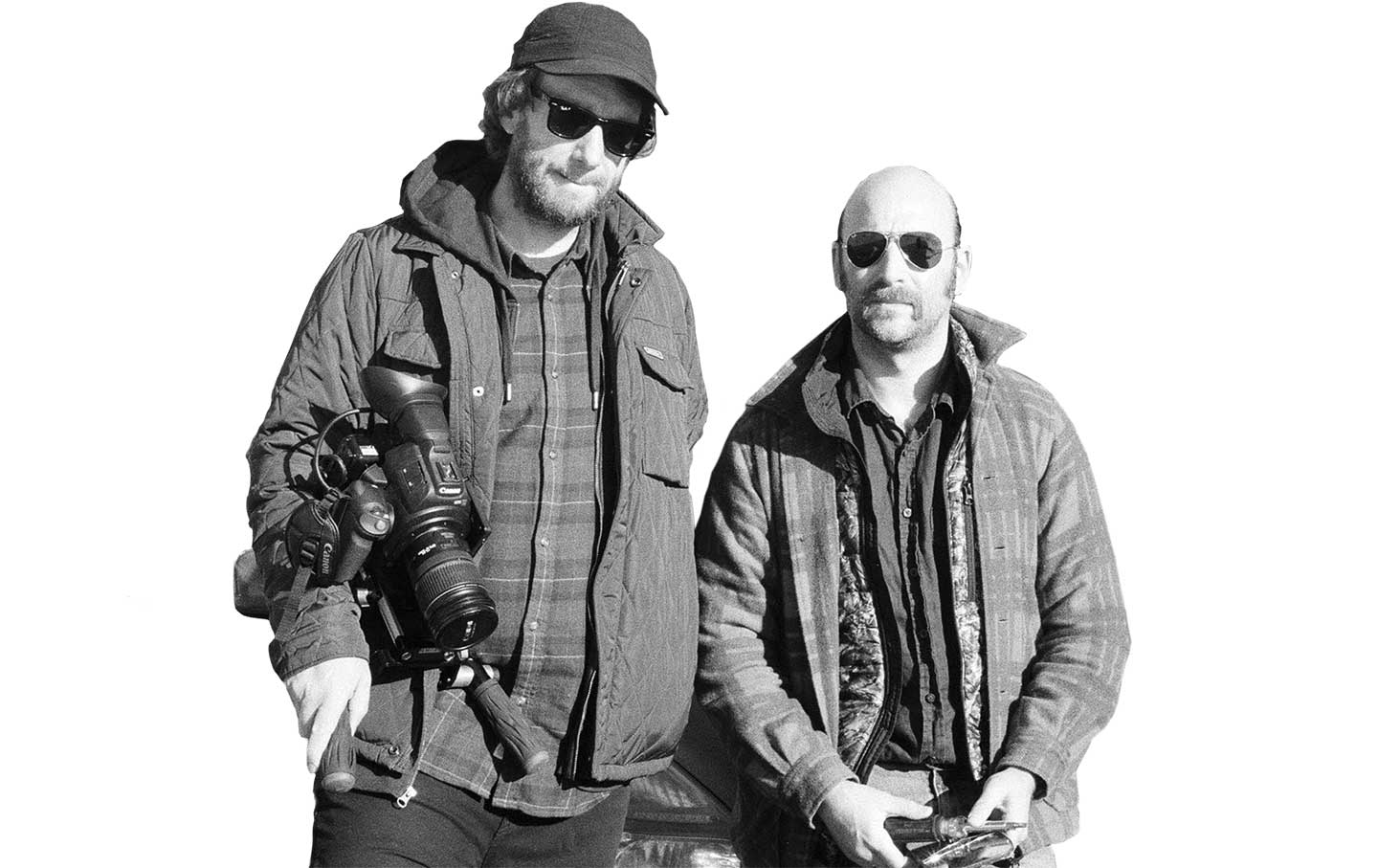
Want to Understand California’s Water Crisis? Look to the Pistachio. Want to Understand California’s Water Crisis? Look to the Pistachio.
A conversation with the documentarians Rowan Wernham and Yasha Levine about their film Pistachio Wars, a look at how one family came to control much of the state’s water.
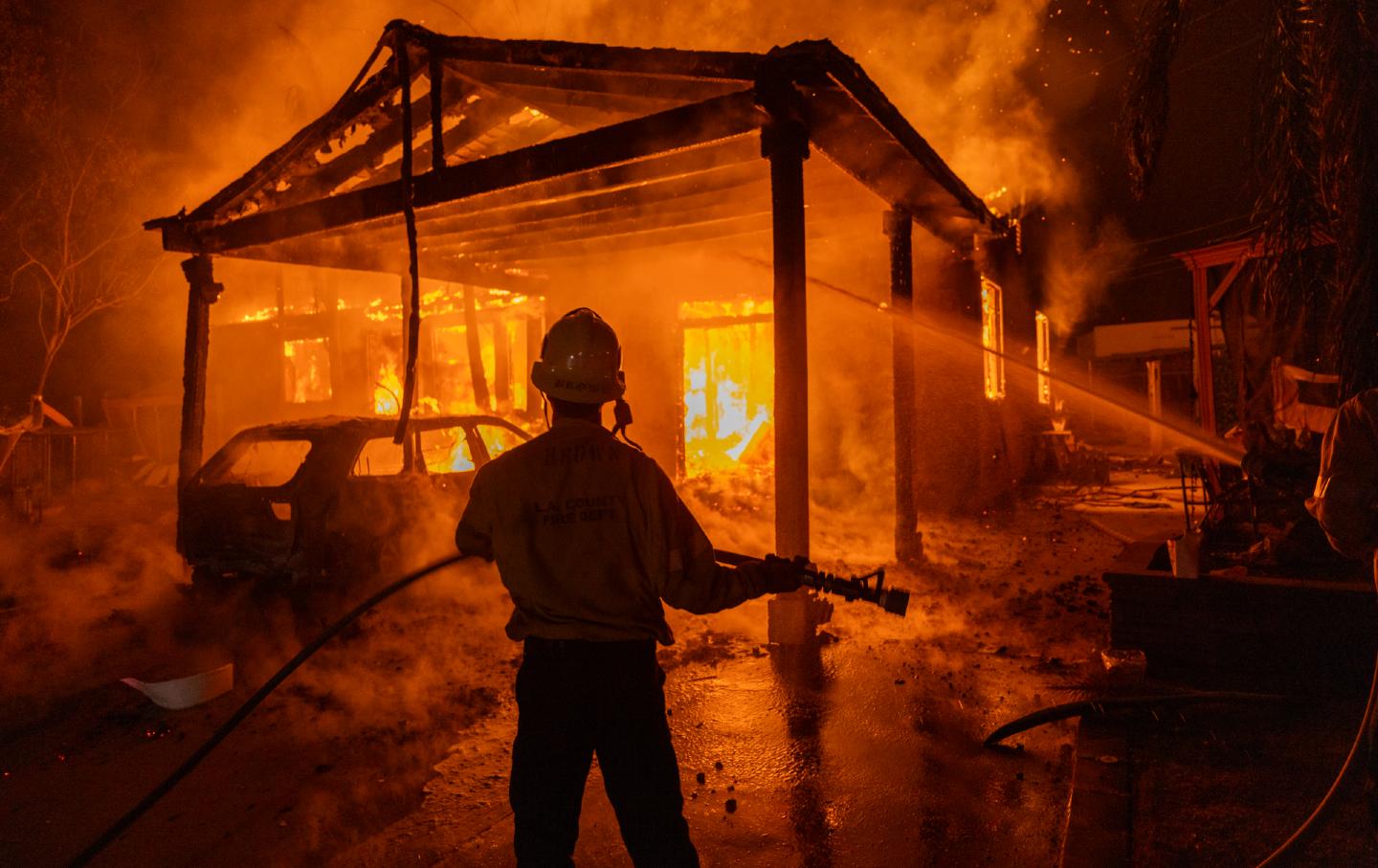
Climate Hushers Need to Get Real Climate Hushers Need to Get Real
Political realism doesn’t outweigh scientific realism.
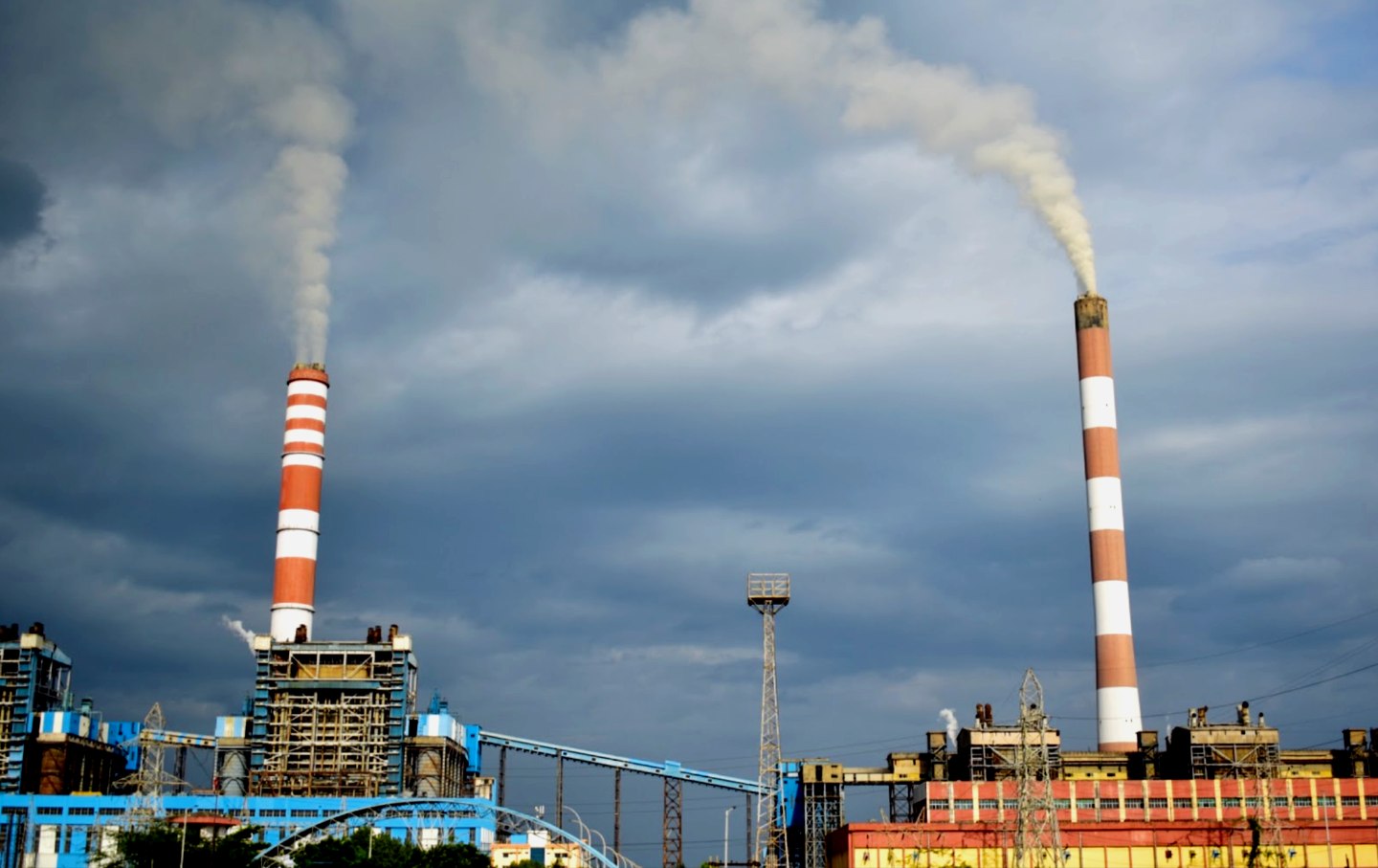
The US Needs India to Buy Coal. Who Pays the Cost? The US Needs India to Buy Coal. Who Pays the Cost?
As the country doubles down on coal exports, local communities—like those in Baltimore and Ennore—will bear the environmental burden.
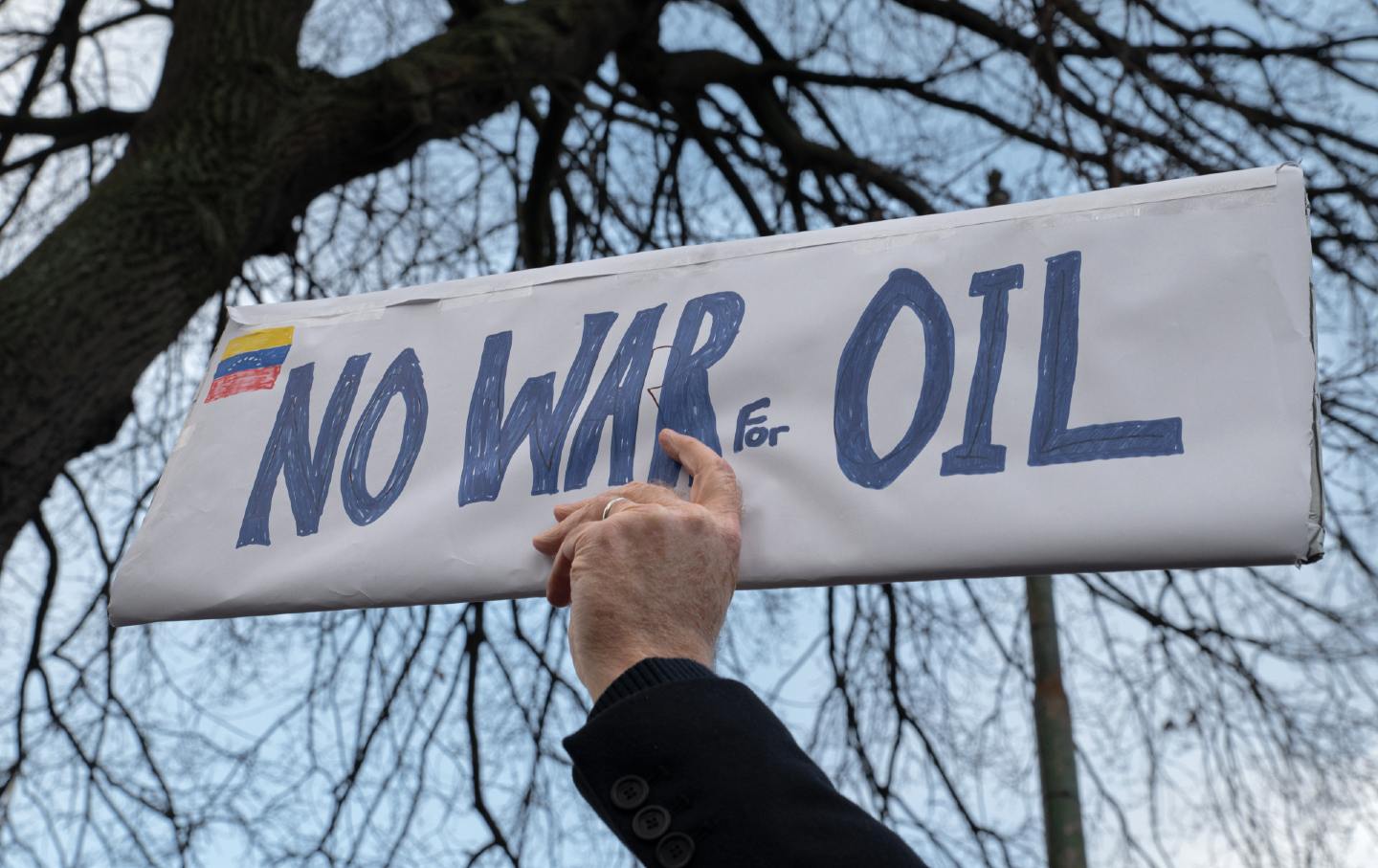
The US Is a Violent Petro-State The US Is a Violent Petro-State
Trump’s attack on Venezuela illustrates fossil fuels’ many perils.
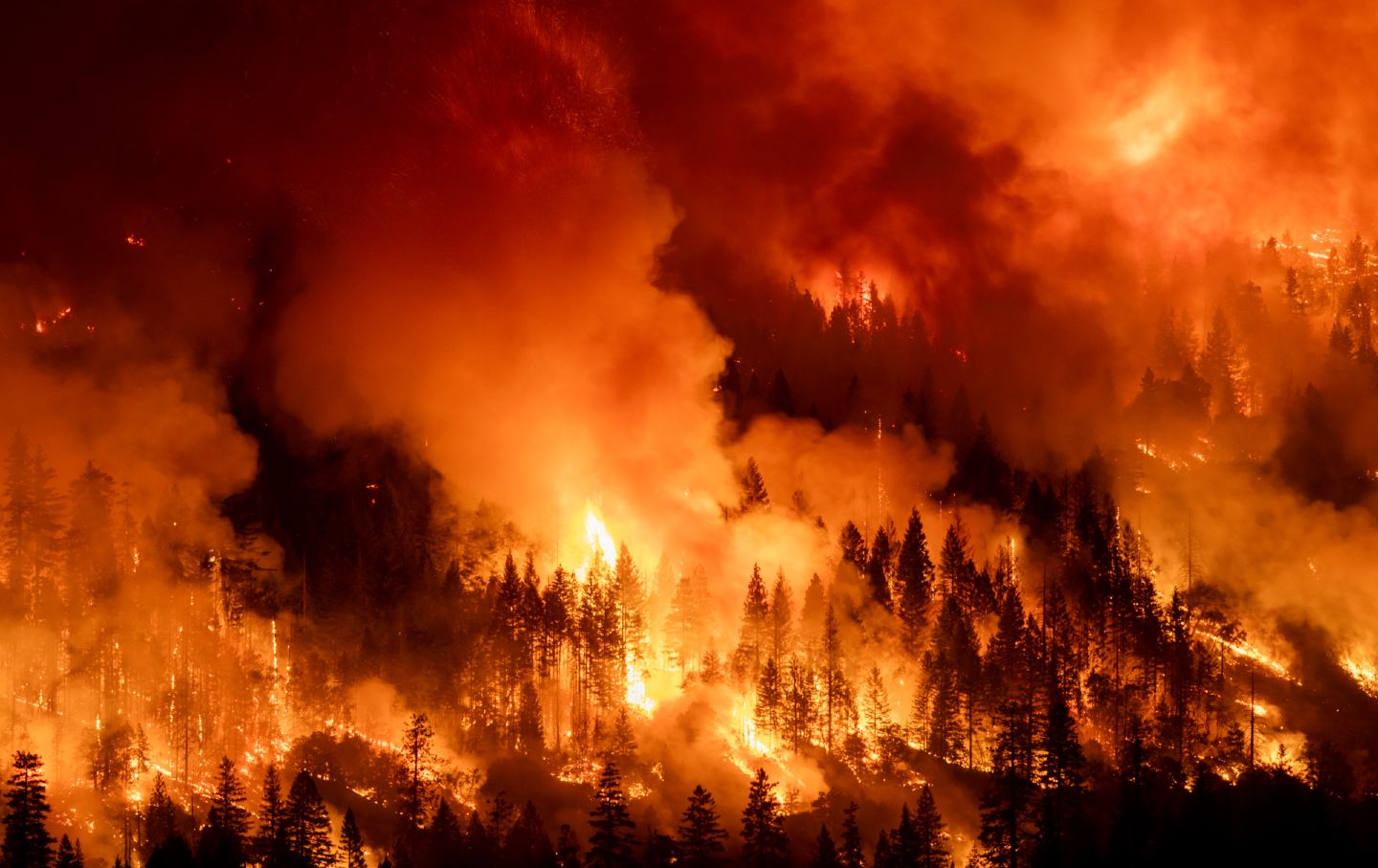
What Justice on a Burning Planet? What Justice on a Burning Planet?
Andreas Malm and Thea Riofrancos joined The Nation’s Wen Stephenson in an urgent conversation about the left and the climate emergency.
Q&A / Wen Stephenson, Andreas Malm, and Thea Riofrancos
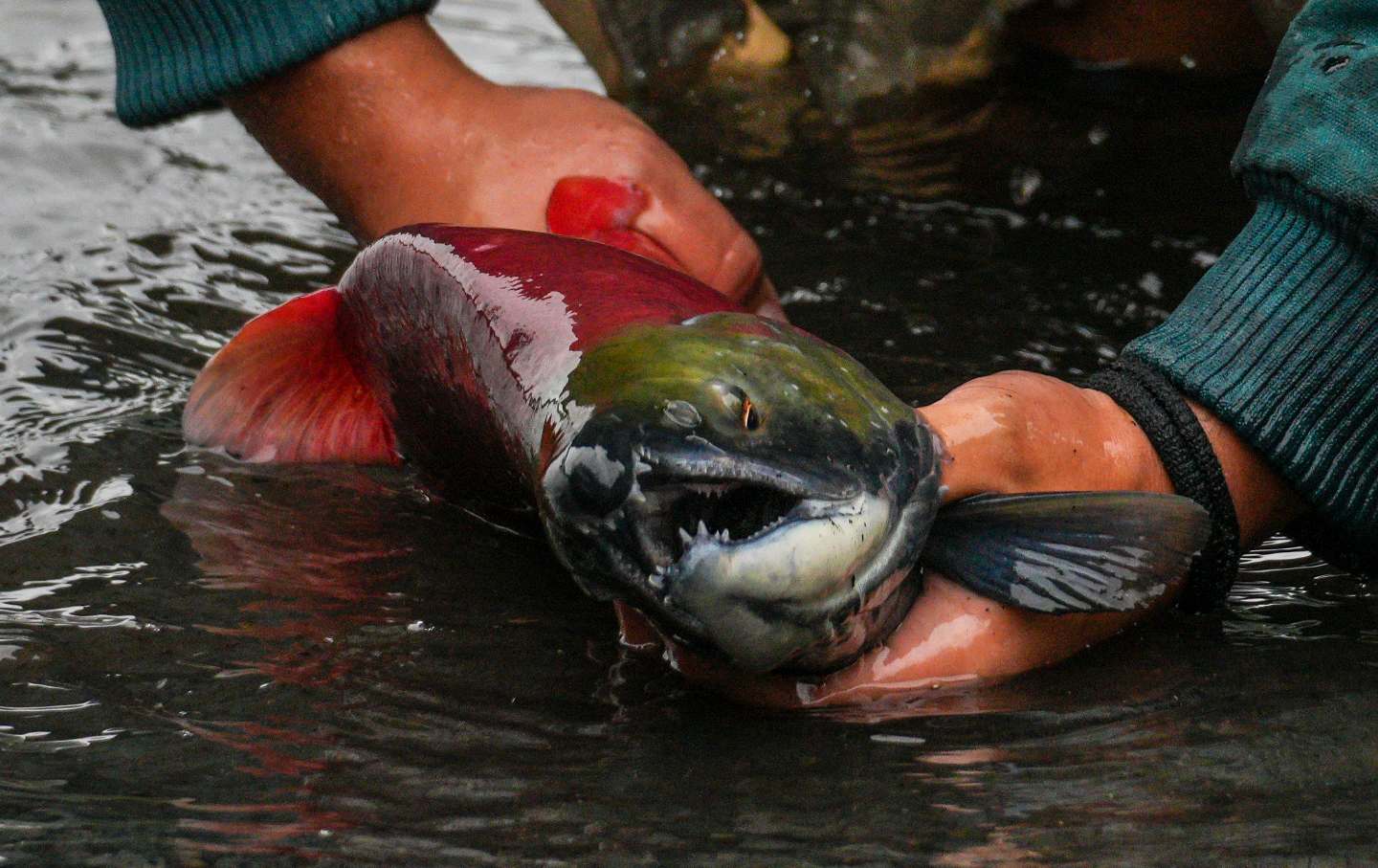
The Fight for the Last Wild Salmon The Fight for the Last Wild Salmon
In Alaska, the last stronghold for wild salmon, Native tribes and conservationists are working to save the fish from both climate change and decades of corporate greed.


